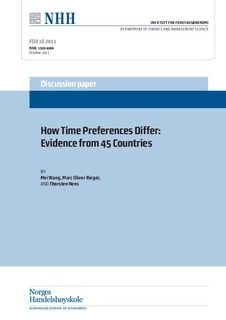| dc.contributor.author | Wang, Mei | |
| dc.contributor.author | Rieger, Marc Oliver | |
| dc.contributor.author | Hens, Thorsten | |
| dc.date.accessioned | 2013-03-08T09:28:11Z | |
| dc.date.available | 2013-03-08T09:28:11Z | |
| dc.date.issued | 2011-10 | |
| dc.identifier.uri | http://hdl.handle.net/11250/164165 | |
| dc.description.abstract | We present results from the first large-scale international survey
on time discounting, conducted in 45 countries. Cross-country variation
cannot simply be explained by economic variables such as interest
rates or inflation. In particular, we find strong evidence for cultural
differences, as measured by the Hofstede cultural dimensions. For example,
high levels of Uncertainty Avoidance or Individualism are both
associated with strong hyperbolic discounting. Moreover, as application
of our data, we find evidence for an impact of time preferences
on the capability of technological innovations in a country and on
environmental protection. | no_NO |
| dc.language.iso | eng | no_NO |
| dc.publisher | Norwegian School of Economics. Department of Finance and Management Science | no_NO |
| dc.relation.ispartofseries | Discussion paper;2011:18 | |
| dc.subject | time preferences | no_NO |
| dc.subject | intertemporal decision | no_NO |
| dc.subject | endogenous preference | no_NO |
| dc.subject | cross-cultural comparison | no_NO |
| dc.title | How time preferences differ : evidence from 45 countries | no_NO |
| dc.type | Working paper | no_NO |
| dc.subject.nsi | VDP::Social science: 200::Economics: 210::Business: 213 | no_NO |
